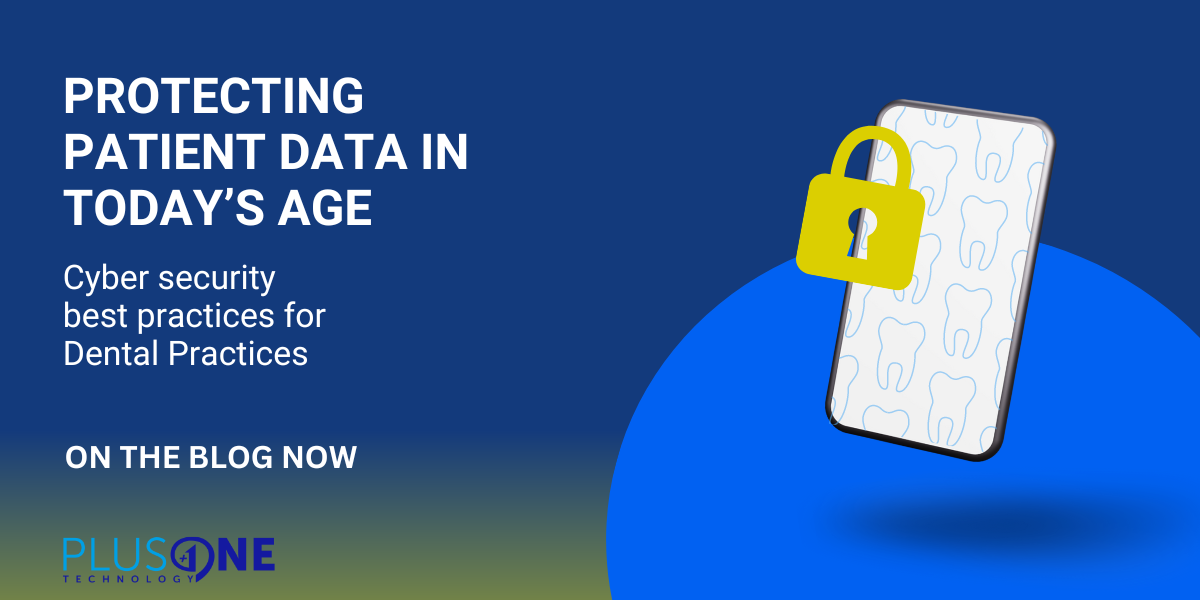Protecting Patient Data in Today’s Digital Age
In an era where digital technology permeates every aspect of our lives, the healthcare sector, including dental practices, must prioritize cyber security to safeguard sensitive patient information. Dental practices, often small and medium-sized enterprises, may sometimes overlook the importance of robust cyber security measures. However, given the sensitive nature of the data they handle, it’s imperative to adopt comprehensive security protocols. This blog post outlines essential cyber security best practices tailored for dental practices to ensure they remain resilient against potential cyber threats.
Understanding the Importance of Cyber Security
Dental practices manage a vast array of sensitive patient data, including medical histories, personal identification information, and financial records. A breach in this data can lead to severe consequences, such as identity theft, financial loss, regulatory fines and damage to the practice’s reputation. Therefore, ensuring the security of this data is not only a regulatory requirement but also a moral obligation to protect patient welfare.
Regulatory Compliance
Adhering to regulations such as the Health Insurance Portability and Accountability Act (HIPAA) in the United States is crucial. These regulations set standards for protecting patient information and mandate specific security measures. Non-compliance can result in hefty fines and legal repercussions.
Moral and Ethical Responsibility
Beyond regulatory obligations, dental practices have a moral duty to protect their patients’ data. Ensuring robust cyber security measures fosters trust and demonstrates a commitment to patient care and confidentiality.
Cyber Security Best Practices
To effectively safeguard patient data, dental practices should implement the following cyber security best practices:
1. Conduct Regular Risk Assessments
Regular risk assessments help identify potential vulnerabilities within the practice’s digital infrastructure. These assessments should evaluate the effectiveness of existing security measures and highlight areas needing improvement. Engaging a professional cyber security firm such as Plus 1 Technology can provide an objective analysis and expert recommendations.
2. Implement Strong Access Controls
Restricting access to sensitive data is fundamental. Only authorized personnel should have access to patient information. Implementing multi-factor authentication (MFA) and strong, unique passwords can significantly enhance access controls. Regularly updating passwords and revoking access for former employees are also essential practices.
3. Encrypt Sensitive Data
Encryption converts data into a coded format, making it unreadable without the correct decryption key. Encrypting sensitive patient information ensures that even if data is intercepted, it remains protected. Both data at rest and data in transit should be encrypted.
4. Regularly Update Software and Systems
Outdated software and systems are vulnerable to cyber-attacks. Regularly updating operating systems, dental practice management software, and security tools is crucial. These updates often include patches for security vulnerabilities that could be exploited by cybercriminals.
5. Backup Data Regularly
Regular data backups are essential for data recovery in the event of a cyber-attack, such as ransomware. Backups should be stored securely, both on-site and off-site, and tested periodically to ensure data integrity and the ability to restore operations swiftly.
6. Train Staff on Cyber Security Awareness
Human error is a significant factor in many cyber incidents. Regular training sessions on cyber security awareness can educate staff on recognizing phishing attempts, safe browsing practices, and the importance of following security protocols. A well-informed team is a crucial line of defense against cyber threats.
7. Employ Advanced Security Measures
Implementing advanced security measures such as firewalls, intrusion detection systems (IDS), and next-generation endpoint protection can provide additional layers of protection. These tools monitor network traffic, detect suspicious activities, and prevent malware infections.
8. Develop an Incident Response Plan
Despite the best preventive measures, cyber incidents can still occur. Having a well-defined incident response plan ensures that the practice can respond swiftly and effectively to minimize damage. The plan should outline procedures for identifying, containing, eradicating, and recovering from a cyber incident.
9. Perform Regular Audits and Monitoring
Regular audits and continuous monitoring of network activities can help detect anomalies early. Automated monitoring tools can alert administrators to potential security breaches in real-time, allowing for prompt action.
10. Secure Physical Access
Cyber security is not solely about digital measures; physical security is equally important. Ensure that servers, workstations, and other critical hardware are stored in secure areas accessible only to authorized personnel. Physical barriers, security cameras, and access logs can enhance physical security.
11. Partner with an MSP
Trying to tackle cyber security and compliance is not something that practices can do on their own. It is critical that you partner with an MSP such as Plus 1 Technology to ensure all your systems are monitored, managed, and secured.
Conclusion
Incorporating these cyber security best practices can significantly enhance the security posture of dental practices, ensuring the protection of sensitive patient data and the continuity of operations. By understanding the importance of cyber security and implementing comprehensive measures, dental practices can build a resilient defense against the ever-evolving landscape of cyber threats. Prioritizing cyber security not only complies with regulatory requirements but also upholds the trust and confidence that patients place in their healthcare providers.
In this digital age, safeguarding patient data is paramount. Dental practices must stay vigilant, regularly update their security protocols, and foster a culture of cyber security awareness. By doing so, they can navigate the complexities of modern cyber threats and continue to provide exceptional care to their patients.



